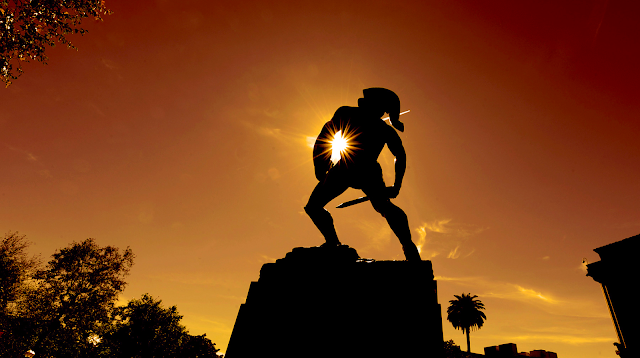TL;DR
- Say cheese, singularity!!
- Quantum gravity and the theory of everything
- The right stuff - America's first astronauts
Current events
I was planning on discussing the Falcon Heavy launch that was supposed to happen yesterday, but it got delayed because of high winds. Ugh! But thankfully, this was a huge week for space - yesterday morning astronomers released the FIRST EVER direct image of a black hole. Here it is!
 |
| Taken by the aptly named Event Horizon Telescope. It reminds me of the eye of Sauron from Lord of the Rings |
There's already tons of press covering the black hole - it's at the center of a galaxy 53 million light years away called Messier 87, billions of times more massive than the Sun, and larger than our whole solar system (a behemoth even by cosmic standards!)
For the longest time, people thought photographing a black hole was impossible because it emits no light, hence the name. But the lead proponent on this project, Prof. Heino Falcke, realized there might be strong radio wave emission in the area surrounding the black hole that we could detect. Ultimately it took an array of 8 humongous telescopes, collectively known as the Event Horizon Telescope Array, because no single telescope is powerful to capture it. And the precision was unbelievable. I'm told it's like seeing the date on a quarter in DC from LA!
 |
| Katie Bouman, who developed the algorithm that produced the black hole image, next to all the hard drives containing millions of gigabytes of data |
Fun fact, the data produced by the 8 telescopes over their 10 day scan of M87 was so massive, it couldn't be sent over the Internet; the research team literally saved it all down on hundreds of hard drives, then flew them all together to be processed!
Today I learned
What's the big deal with black holes anyway? Why are they so important? To understand this, we need some background on the two theories that make up the pillars of modern physics - general relativity and quantum mechanics. Einstein's theory of relativity accurately describes gravity in the macroscopic realm, while quantum mechanics accurately describes the world of subatomic particles, where gravity is negligible but the electromagnetic and nuclear forces reign supreme
Here's the catch - the two are mutually exclusive. We haven't been able to mathematically reconcile the two, and that's a problem becuase black holes are huge amounts of matter with immense gravity packed into an infinitely small volume. To understand them, we need a new theory of quantum gravity that unifies the two, hence a phrase you may have heard of, the theory of everything
Black holes matter because they're a window to what the Universe was before the Big Bang: an infinitely dense point mass where space and time are meaningless. Understanding them may give us an answer to the very nature of Creation. Einstein and Hawking, arguably the two greatest minds of the 20th century, recognized this and dedicated their whole lives to its research. Perhaps a new, 21st century genius will solve the problem...
This week in space history
On April 9, 1959, NASA announced its very first class of astronauts, the legendary Mercury 7. In the borderline panic that ensured after the Soviet Union launched Sputnik, the first artificial satellite, the US formed NASA and tasked them with putting a man in space before the Soviets did. The seven men that were selected were all military test pilots who met the following criteria:
- <40 years old
- <5'11''
- excellent physically condition
- bachelors degree
- graduate of a test pilot school
- >1,500 hrs of flying time
- qualified jet pilot
And their personalities were exactly what you'd expect out of hot-shot fighter pilot aces - their patriotism was matched only by their egos. But as soon as they were announced, they instantly became national celebrities, heroes in their own time. And they would go on to fly in all four US manned space programs - Mercury, Gemini, Apollo, and Space Shuttle
 |
| Back row: Alan Shepard, Gus Grissom, Gordon Cooper Front row: Wally Schirra, Deke Slayton, John Glenn, Scott Carpenter |





No comments